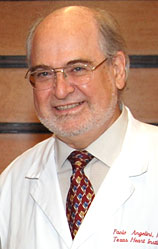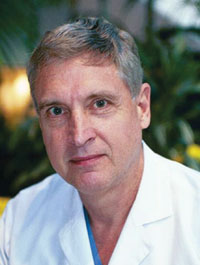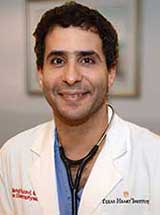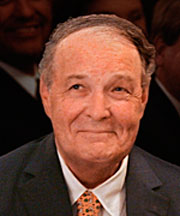August 27, 2014
Congratulations and a measure of limelight are due to several of our Texas Heart Institute (THI) physicians.

Dr. Paolo Angelini
|
First, to Dr. Paolo Angelini, director of THI’s Center for Coronary Artery Anomalies (CCAA). He has just published a paper in the prestigious Circulation: Cardiovascular Imaging, a journal of the American Heart Association, outlining some methodology being used in the CCAA’s study of the cardiac anomalies associated with Sudden Cardiac Death (SCD) in young people, particularly young athletes and military recruits.
With generous support from Houston’s Kinder Foundation, the CCAA is almost halfway toward its goal of screening 10,000 youths of middle school, high school and college age to learn more about the prevalence of such heart abnormalities in a large diverse population like Houston’s.
A unique feature of the study is its combination of ECG (electrocardiogram) and MRI (Magnetic Resonance Imaging) in this screening study. As Dr. Angelini, a recognized leader in this field, writes in his journal piece, this protocol for identifying such heart abnormalities “has dramatically improved reliability and efficiency.”
That is an important step toward a better understanding of the causes of SCD. Then, as Dr. Angelini describes, “we can at least start claiming to know precisely how many people in our communities live with potentially significant [coronary artery anomalies] and are at increased risk of unexpected, but potentially preventable, catastrophes or disabilities.”
To learn more about the study, visit our website.

Dr. George P. Noon
|
Additionally,
Dr. George P. Noon has been awarded the
2014 Ben and Margaret Love Foundation Bobby Alford Award for Academic Clinical Professionalism at Baylor College of Medicine (BCM), where he serves as a professor of surgery. Dr. Noon has been a stalwart pioneer in the fields of transplant and cardiac assist devices.
As the BCM award announcement points out, “For more than 50 years, Dr. Noon has served the Houston community as an academic, a physician, and a leader in the development and implementation of cutting-edge procedures and technologies that have made a difference in the lives of countless patients from Houston and around the world.”
This is a very well-deserved accolade.
Finally, hats off to
Dr. Razavi Mehdi , whose start-up company,
Saranas, is going to market with a new device designed to detect bleeding complications in patients undergoing vascular access procedures in their blood vessels.

Dr. Mehdi Razavi
|
Each year about 20 million people undergo such procedures and in some cases there can be an accidental puncture of a blood vessel that can cause a slow leak. These leaks can take hours to detect and often require additional medical procedures to remedy.The new device adds sensors to the standard sheath through which the catheter is typically threaded. The sensors can detect bleeding within minutes so that the bleeding can be addressed at a very early stage.
The device was a winner last fall of the prestigious Goradia Prize by the Houston Technology Center, in collaboration with Opportunity Houston. The monetary prize is given to early-stage companies from the Texas Gulf Coast region that have yet to largely commercialize their innovations. The Goradia winners are selected based on their discovery’s commercial potential, a sound business plan, potential to contribute to local job growth, and likelihood of business success in the long run.
Congratulations to these three outstanding physician-scientists who embody the dedication, ingenuity and compassion that are the lifeblood of THI. And, as always, we offer our sincerest gratitude to those of you who help support this kind of life-changing, life-saving work and THI.
With gratitude and respect,

James T. Willerson, MD
President
P.S. The generosity in your hearts has changed the lives of others. THI can continue as a world leader in life-saving medical research and advanced treatments with your support.
Your heart, our minds, together change lives. Here we share some of our stories.
Contact Dr. Willerson.



